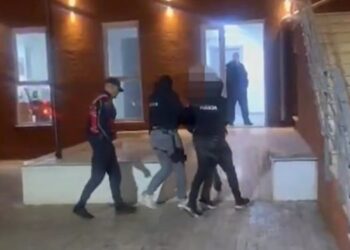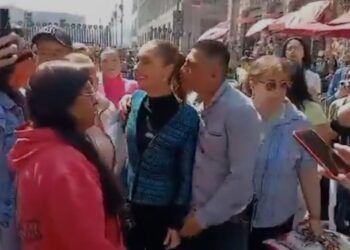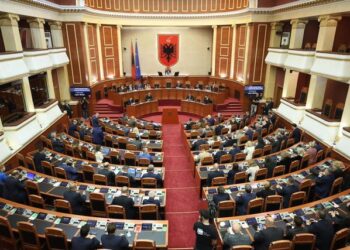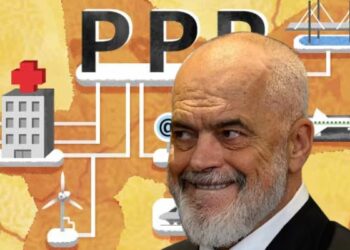By Boldnews.al
Bulgaria, the poorest EU country has become a source of hope for hundreds of residents of the Kukës Gorani community, who are massively emigrating as European citizens thanks to the supply of Bulgarian passports.
Every week in downtown Kukës, unusual passengers climb with documents in their hands inside a van and leave for an eight-hour journey to Sofia, the capital of Bulgaria. Passengers belong to the Gorë area, known for their bilingual community and through this trip, hoping to win a Bulgarian passport that opened the doors to the European Union.
The driver of the van, the Gorani and also of Zapodi, smelled a good business opportunity when the interest for Bulgarian cards grew and decided to make a regular Kukës-Sofia return, versus a good price of 60 euros.
“I go to dinner and arrive early in the morning in Sofia. My passengers have the opportunity to register in the Sofia neighborhoods (a condition for obtaining citizenship) or to finish the jobs in the Presidency, “T.Bajraktari driver told BIRN.
Bulgaria is the country with the lowest living standards within the European Union, but it has become a source of hope for hundreds of inhabitants of the Gora area in the northeast of Albania.
Nine villages of this area are populated by residents who have inherited the Slavic language similar to the Macedonian one, believed to have been entrenched between the 11th and 13th centuries, when Bulgaria was involved in the bogomile movement – that residents inhabit “the beloved of God “.
Through the two decades of transition, this community is often tempted by Balkan citizenship offers.
In the 1990s, Serbs came through hiding efforts to prepare Gora for their minority in Albania. Then, the Macedonians also pursued a similar thing, promising even the Gorani passports.
The third were the Bulgarians who, unlike the first two contenders, managed to cause the largest wave of emigration and emptying the area from its inhabitants.
At the beginning of 2015, the villages of Shishtavec and Zapod settled in the media focus to illustrate the high influx of departure from Albania and asylum applications in EU countries.
Indeed, the residents of these villages used the new Bulgarian passports to start a new life in the West, many times more favored than thousands of Albanians who ended up in asylum seekers camps.
Association, the consulate’s parade
During the five days of the week, in front of the Bulgarian consulate in Tirana, she sees groups of residents of Gora, who are waiting for the order to apply for Bulgarian citizenship. At the entrance of the gate, Nuredin Nuredinaj – originally from Gora and a residence in Farka – controls the documents and advises the applicant about the deficiencies they might have.
Nuredinaj plays the role of the official translator of the Consulate, although Gorani do not find it difficult to communicate directly with the Bulgarian consul.
In the first phase of the application, they must submit the birth certificate, the family certificate and trunk certificate from the father and mother; four with prefecture firm and apostille stamp of the Ministry of Foreign Affairs.
A fifth document, however, plays an essential role in obtaining a passport; applicants must register as members of the association “Prosperitet Golloborda”.
Just like before the Bulgarian consulate, Gorani rank finds near the headquarters of this association, which is located in a separate palace in the Ali Demi neighborhood of Tirana. A proof of gollobordas origin, together with the membership card of the association, costs them 150 euros.
The Bulgarian consulate and the “Golloborda prosperity” play the role of two communication vessels for candidates aspiring to the citizenship of a European Union country. At the headquarters of the association, BIRN observed the frequent movement of a “Hyndai” vehicle with Bulgarian license plates, whose passenger was also an employee of the consulate.
The chairman of this association, Haxhi Pirushi, awaits people, and adds the association to the new members who are looking forward to gaining Bulgarian citizenship.
Gora residents told BIRN that Bulgarian passport applications received high popularity in 2012, but the procedures were considered invalid and interested were advised to repeat the documents.
“With the arrival of the new government of Boyko Borisov, the chances are added too much to obtain a Bulgarian passport, while the time limits have been significantly reduced,” says E.Nuredini, born in Oreshka Gora and resident in Farkë të Tiranës.
Ethnic minority “controversial”
Bulgaria’s demands for recognition of the “Bulgarian ethnic minority” in Albania have caused little comment among the bilingual communities in Kukës. In the last two decades, diplomats from the Balkan countries and certain segments of the politics and academic academies of these countries, benefiting from the unfavorable economic circumstances of Albania have shown increasing appetite to “uncover” ethnic minorities, possibly communities with a large number of residents.
Zenulla Bala, a retired teacher and scholars from Shishtaveci, advocates that the Gorani community has expanded with Albanian residents of surrounding areas who later learned their own language. In the monograph entitled “Shishtaveci, history and tradition,” Bala writes that many residents have been there for centuries from the villages Surroi, Nanga e Lumës, Topojani, Novoseja and Tetova.
“I’m from Mati for myself. I was born in Shishtavec, I lived in Përmet, I studied in Tirana and I call myself Albanian, “says Bala.
Bulgarian claims about this community, according to him, date back to the 11th century, although they are not based on documents. Torbesh – as is otherwise called Kukes Gorani is considered as the last remnant of the bogomile movement, displaced by the persecutions that Bulgarian Catholics have made to the Orthodox population.
In addition to the history of the area, Bala has also studied the demographic movement of the area after the 1990s, where it turns out that Shishtaveci has lost ¾ of its population in recent years. In his 87-page study, it is reported that out of 2,000 residents after the 90s, there were 460 remaining in the village, mostly of the third age.
Beyond controversial discussions on ethnicity, residents of this area have chosen to be pragmatic in the face of the golden opportunity of Bulgarian citizenship as a way to escape poverty and lack of prospects in one of the poorest areas of the country.
New passports enable them to stay in different European Union countries and in England as well as numerous facilities in child education.














